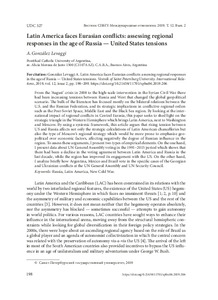Por favor, use este identificador para citar o enlazar este ítem:
https://repositorio.uca.edu.ar/handle/123456789/10793| Campo DC | Valor | Lengua/Idioma |
|---|---|---|
| dc.contributor.author | González Levaggi, Ariel | es |
| dc.coverage.spatial | Rusia | es |
| dc.coverage.spatial | América Latina | es |
| dc.coverage.spatial | Estados Unidos | es |
| dc.date.accessioned | 2020-10-23T13:00:27Z | - |
| dc.date.available | 2020-10-23T13:00:27Z | - |
| dc.date.issued | 2019 | - |
| dc.identifier.citation | González Levaggi, A. Latin America faces Eurasian conflicts: assessing regional responses in the age of Russia. United States tensions [en línea]. Boletín de Relaciones Internacionales de la Universidad Estatal de San Petersburgo. 2019, 12 (2). Disponible en: https://repositorio.uca.edu.ar/handle/123456789/10793 | es |
| dc.identifier.issn | 2658-6029 | - |
| dc.identifier.issn | 2658-3615 (online) | - |
| dc.identifier.uri | https://repositorio.uca.edu.ar/handle/123456789/10793 | - |
| dc.description.abstract | From the ‘August’ crisis in 2008 to the high-scale intervention in the Syrian Civil War there had been increasing tensions between Russia and West that changed the global geopolitical scenario. The bulk of the literature has focused mostly on the bilateral relations between the U.S. and the Russian Federation, and its strategic implications in conflictive regional orders such as the Post-Soviet Space, Middle East and the Black Sea region. By looking at the international impact of regional conflicts in Central Eurasia, this paper seeks to shed light on the strategic triangle in the Western Hemisphere which brings Latin America, next to Washington and Moscow. By using a systemic framework, this article argues that rising tension between US and Russia affects not only the strategic calculations of Latin American chancelleries but also the type of Moscow’s regional strategy which would be more prone to emphasize geopolitical over economic factors, affecting negatively the degree of Russian influence in the region. To assess these arguments, I present two types of empirical elements. On the one hand, I present data about UN General Assembly voting in the 1991–2015 period which shows that there had been a decline in the voting agreement between Latin America and Russia in the last decade, while the region has improved its engagement with the US. On the other hand, I analyze briefly how Argentina, Mexico and Brazil vote in the specific cases of the Georgian and Ukrainian conflicts at the UN General Assembly and UN Security Counci | es |
| dc.format | application/pdf | es |
| dc.language.iso | eng | es |
| dc.publisher | Universidad Estatal de San Petersburgo | es |
| dc.rights | Acceso abierto | * |
| dc.rights.uri | http://creativecommons.org/licenses/by-nc-sa/4.0/ | * |
| dc.source | Boletín de Relaciones Internacionales de la Universidad Estatal de San Petersburgo Vol. 12, No. 2, 2019 | es |
| dc.subject | CONFLICTOS INTERNACIONALES | es |
| dc.subject | ORDEN MUNDIAL | es |
| dc.subject | GUERRA FRIA | es |
| dc.subject | HEGEMONISMO | es |
| dc.subject | GEOPOLITICA | es |
| dc.title | Latin America faces Eurasian conflicts: assessing regional responses in the age of Russia. United States tensions | es |
| dc.type | Artículo | es |
| dc.identifier.doi | https://doi.org/10.21638/11701/spbu06.2019.206 | - |
| uca.disciplina | CIENCIA POLITICA | es |
| uca.issnrd | 1 | es |
| uca.affiliation | Fil: González Levaggi, Ariel. Pontificia Universidad Católica Argentina. Facultad de Ciencias Sociales. Departamento de Ciencias Políticas y Relaciones Internacionales. Facultad de Ciencias Sociales; Argentina | es |
| uca.version | publishedVersion | es |
| item.languageiso639-1 | en | - |
| item.fulltext | With Fulltext | - |
| item.grantfulltext | open | - |
| crisitem.author.dept | Facultad de Ciencias Sociales | - |
| crisitem.author.dept | Departamento de Ciencias Políticas y Relaciones Internacionales | - |
| crisitem.author.parentorg | Pontificia Universidad Católica Argentina | - |
| crisitem.author.parentorg | Facultad "Teresa de Ávila" (Paraná) | - |
| Aparece en las colecciones: | Artículos | |
Ficheros en este ítem:
| Fichero | Descripción | Tamaño | Formato | |
|---|---|---|---|---|
| latin-american-faces-eurasian.pdf | 761,8 kB | Adobe PDF |  Visualizar/Abrir |
Visualizaciones de página(s)
108
comprobado en 30-abr-2024
Descarga(s)
131
comprobado en 30-abr-2024
Google ScholarTM
Ver en Google Scholar
Altmetric
Altmetric
Este ítem está sujeto a una Licencia Creative Commons

